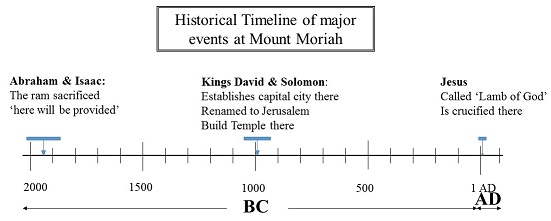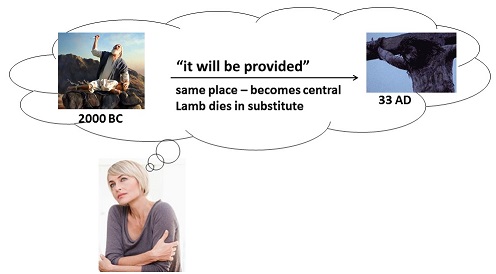Listen to the speaker read the text, then read it out loud trying to copy the speaker.
The multiple choice questions at the end of the text will help you understand the text better.
Abraham lived 4000 years ago, traveling to modern-day Israel. He was promised a son that would become a ‘great nation’, but he had to wait until he was very old to see his son born. Jews and Arabs today come from Abraham, so we know the promise came true and that he is an important person in history as the father of great nations.
Abraham was now very happy to watch his son Isaac grow up into a man. But then God tested Abraham with a difficult task. God said:
“Go get Isaac, your only son, the one you dearly love! Take him to the land of Moriah, and I will show you a mountain where you must sacrifice him to me on the fires of an altar.” (Genesis 22:2)
This is hard to understand! Why would God ask Abraham to do this? But Abraham, who had learned to trust God – even when he did not understand
… got up early the next morning … and left with Isaac and two servants for the place where God had told him to go. (Genesis 22:3)
After three days travel they reached the mountain. Then
…when they reached the place that God had told him about, Abraham built an altar and placed the wood on it. Next, he tied up his son and put him on the wood. He then took the knife and got ready to kill his son. (Genesis 22: 9-10)
Abraham was ready to obey God. Just then something remarkable happened
But the Lord’s angel shouted from heaven, “Abraham! Abraham!”
“Here I am!” he answered.
“Don’t hurt the boy or harm him in any way!” the angel said. “Now I know that you truly obey God, because you were willing to offer him your only son.”
Abraham looked up and saw a ram caught by its horns in the bushes. So he took the ram and sacrificed it in place of his son. (Genesis 22: 11-13)
At the last moment Isaac was saved from death and Abraham saw a male sheep and sacrificed it instead. God had provided a ram and the ram took the place of Isaac.
Here I would like to ask a question. At this point in the story is the ram dead or alive?
Why do I ask? Because Abraham will now give a name to the place, but most people miss its importance. The story continues…
Abraham named that place “The Lord Will Provide.” And even now people say, “On the mountain of the Lord it will be provided.” (Genesis 22:14)
Another question: Is the name that Abraham gave to that place (“The Lord Will Provide”) in the past, present or future tense?
Looking to the future, not the past
It is clearly in the future tense. Many people think that Abraham, when naming that place, was thinking of the ram provided by God by getting caught in the thicket and then sacrificed in place of his Isaac. But when Abraham gave the name that ram was already dead and sacrificed. If Abraham was thinking of that ram – already dead and sacrificed – he would have named it ‘The LORD has provided’ – in the past tense. And the closing comment would read ‘And even now people say “On the mountain of the LORD it was provided”’. But the name looks to the future, not the past. Abraham is not thinking of the already dead ram. He is naming it for something else – in the future. But what?
Where is that place?
Remember where this sacrifice occurred, told at the beginning of the story:
(“Go get Isaac, …. Take him to the land of Moriah”)
This happened at ‘Moriah’. Where is that? It was wilderness in Abraham’s day (2000 BC), with only some bushes, a wild ram, and Abraham & Isaac on that mountain. But one thousand years later (1000 BC) King David built the city of Jerusalem there, and his son Solomon built the First Jewish Temple there. We read later in the Old Testament that:
Then Solomon began to build the temple of the LORD in Jerusalem on Mount Moriah… (2 Chronicles 3:1)
Mount Moriah became Jerusalem, the Jewish city with the Jewish Temple. Today it is a holy place for the Jewish people, and Jerusalem is the capital city of Israel.
The sacrifice of Abraham and Jesus
Let us think a little about the titles of Jesus. Jesus’ most well-known title is ‘Christ’. But he had other titles, like
The next day John saw Jesus coming toward him and said, “Look, the Lamb of God, who takes away the sin of the world. (John 1:29)
Jesus was also called ‘The Lamb of God‘. Think about the end of Jesus’ life. Where was he arrested and crucified? It was in Jerusalem (which is the same as ‘Mount Moriah’). It is very clearly stated that:
He [Pilate] learned that Jesus was under Herod’s authority. Herod was in Jerusalem at that time, so Pilate sent Jesus to him. (Luke 23:7)
The arrest, trial and death of Jesus was in Jerusalem (= Mount Moriah). The timeline shows the events that have happened at Mount Moriah.

Back to Abraham. Why did he name that place in the future tense ‘The LORD will provide’? Isaac had been saved at the last moment when a lamb was sacrificed in his place. Two thousand years later, Jesus is called ‘Lamb of God’ and he is sacrificed at the same location – so you & I could also live.
A Divine Plan
It is like a Mind has connected these two events that are separated by 2000 years of history. What makes the connection unique is that the first event points to the later event by the name in the future tense. But how would Abraham know what would happen in the future? No human knows the future, especially that far into the future. Only God can know the future. Foreseeing the future and having these events happen at the same place is evidence that this is not a human plan, but a plan from God. He wants us to think about this like the image below

Good News for all nations
This story also has a promise for you. At the end of this story God promises to Abraham that:
“…through your offspring all nations on earth will be blessed because you have obeyed me” (Genesis 22:18)
If you belong to one of the ‘nations on earth’ then this is a promise to you for a ‘blessing’ from God.
So what is this ‘blessing’? How do you get it? Think of the story. Just like the ram saved Isaac from death, so Jesus the Lamb of God, by his sacrifice at the same place, saves us from the power of death. If that is true it would certainly be good news.
The sacrifice of Abraham on Mount Moriah is an important event in ancient history. It is remembered and celebrated by millions around the world today. But it is also a story for you living 4000 years later. Its theme is continued with Moses.
Common Expressions
Below you can find common English expressions that are used when talking about uncertainty.
“blessing in disguise” – Something that at first looks bad turns out to be a good thing.
Example: “Getting fired from that job was a blessing in disguise because I went back to school and became a teacher.”
“A Bird in the Hand is worth two in the Bush” – It is better to hold onto something you have than to risk trying to get something greater
Example: “Don’t quit your good job here and move to the USA. A bird in the hand is worth two int the bush.”
“To breathe a sigh of relief” – Once something difficult is finished, you can relax.
Example: “I finished my last exam and breathed a sigh of relief. No more studying!

This story of Abraham,Isaac and connected to our savior Jesus Christ is defined very well known knowledge for blessing to us all.This is the very blessed moment when I personally read the article.
I am believer and waiting for my own son which is also promised, I am doing some mistakes during my journey of my faith which putting me keep waiting for my son.Please keep me in your prayers for God’s special blessings to not do anything wrong against God’s plan.
This story of Abraham,Isaac and connected to our savior Jesus Christ is defined very well known knowledge for blessing to us all.This is the very blessed moment when I personally read the article.
I am believer and waiting for my own son which is also promised, I am doing some mistakes during my journey of my faith which putting me keep waiting for my son.Please keep me in your prayers for God’s special blessings to not do anything wrong against God’s plan.
Comment awaiting
Hi Ali, may God bless you as you wait for your son. Even if you do something wrong, you can confess your sin and hgod will forgive you.